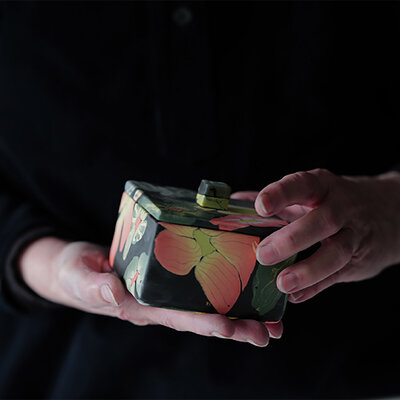Judy McKenzie
Judy obtained her Masters from the Royal College of Art. Her work has appeared in UK galleries, New York and Venice.
Ref: S4D38137
The course will begin with an introduction to some of the contemporary Nerikomi artists practising this fascinating process today. This will give you inspiration for what can be achieved, and an insight into the many and varied approaches to creating individual and unique ceramic works with Nerikomi.
We will move on to the basics of the process with the colouring of clay with ceramic stains and progress to the technique of creating gradations between two colours. Once the clay has been coloured and the gradients made, the more intricate and interesting creation of making the patterned elements that comprise a Nerikomi piece can be explored. This is where your imagination can really come into play, as the possibilities for pattern are seemingly endless.
This is a very time-consuming process. The majority of all Nerikomi work is comprised of colouring the clay and the making of the patterns. A great deal of patience will be required, but once you have all your patterns ready to go, the building of your unique piece can begin.
We will be exploring hand building with a slab of patterned clay. The technique of Tebineri, making a bowl by forming a disc in your hand and draping a slab over a mould. If time allows, building a box, once the patterned slab is of a suitable consistency.
The objective of this course is to give you an understanding of the basic techniques of Nerikomi. It is an individual process, no two artists approach it in the same way, and you will complete the course with the confidence to create your own unique Nerikomi work.
This course is part of our Materials week collection of courses focusing on pigments led by talented artist-tutors. Each course explores a different aspect of using pigments and how they are used in a variety of traditional and contemporary practices. Each tutor will be invited to give a short talk (10 minutes) about an aspect of their work relating to the theme of the week on Tuesday evening at 5.15pm. You will also be encouraged to visit other courses to see work produced across the varied approaches offered in the week.
View all courses in Pigment week
Included is the cost of porcelain and some stoneware clay, and ceramic stains (black, yellow, red) and black slip supplied for the course and firing costs for work left at the College to collect later.
Most tools and equipment are supplied at the College for use during the course, but see below for any additional items that are useful to bring.
Available from tutor:
Please wear appropriate clothing/aprons for the workshop or studio, this includes stout covered footwear (no sandals or open toes).
Firing and glazing options:
Arrival day - first date of course
Residential students can arrive from 4pm, non-residential students to arrive by 6.45pm for registration
Student welcome, followed by dinner: 6.45pm (dinner included)
Teaching session: 8pm-9pm (attendance is essential)
Daily timetable
Course teaching: 9.15am-5pm
Morning session: 9.15am-12.45pm including coffee/tea break
Lunch break: 12.45pm-2pm (lunch included)
Afternoon session: 2pm-5pm including coffee/tea break
Teaching finishes: 5pm
Evening working: students may have access to workshops until 9pm, but only with permission from the tutor and provided any health and safety guidelines are observed.
Departure day - last date of course
Course teaching: 9.15am-3pm (lunch included)
Teaching finishes: 3pm
Residential students will need to check out of rooms by 10am.
Please note, the tutor may make slight variations to the daily timetable as required.

Judy obtained her Masters from the Royal College of Art. Her work has appeared in UK galleries, New York and Venice.
Residential option available. Find out accommodation costs and how to book here.

Take the next step in your creative practice, with foundation level to Masters in Fine Art study.
Depending on your experience, start with an Online Foundation Certificate in Art and Design (one year, part-time), a Foundation Diploma in Art and Design made up of 10 short courses taken over two years (part-time) or advance your learning with our BA (Hons) Art and Contemporary Craft: Materials, Making, and Place (six years part-time). All will help you develop core skills, find direction in your practice and build an impressive portfolio in preparation for artist opportunities or higher-level study. See all degree and diploma courses.